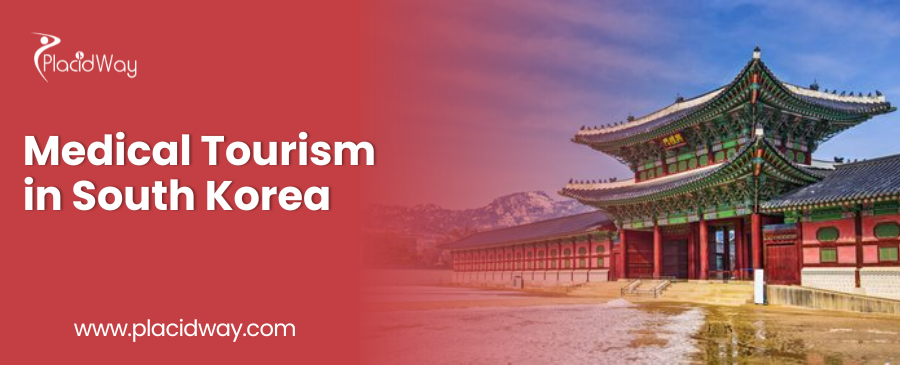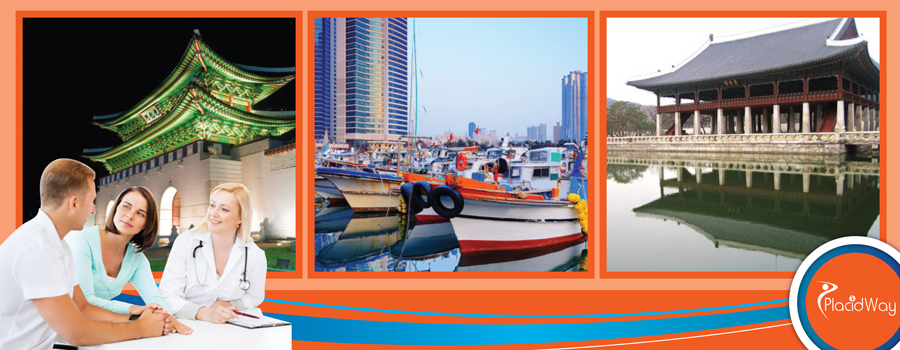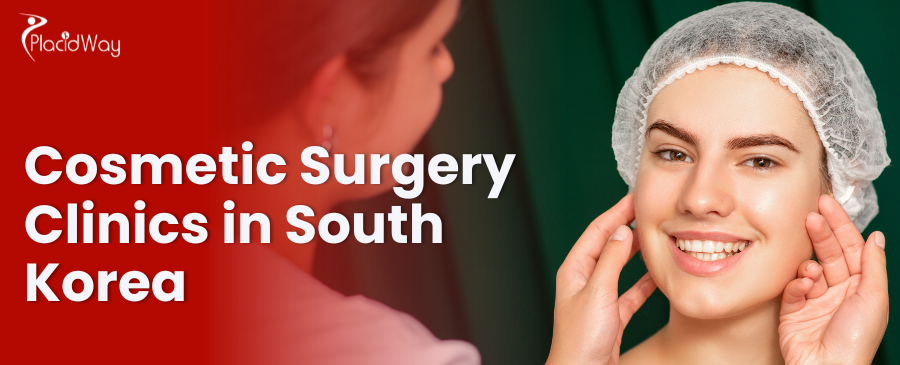South Korea Medical Tourism


Guide to Medical Tourism in South Korea
South Korea, known globally for its technological advancements and rich cultural heritage, has emerged as a powerhouse in the realm of medical tourism. This vibrant Asian country is redefining healthcare standards, attracting a growing number of international patients seeking top-tier medical services combined with a unique cultural experience.
South Korea: At the Forefront of Medical Innovation
South Korea's leap into the forefront of medical tourism is underpinned by its cutting-edge technology, highly skilled medical professionals, and a robust healthcare system. The country is particularly renowned for its advancements in cosmetic surgery, dermatology, and high-tech medical screenings.
A Hub of Medical Excellence
South Korean medical facilities are recognized for their state-of-the-art equipment and innovative treatment techniques. Hospitals and clinics here are not only equipped with the latest technology but are also staffed by specialists who often have international training and experience.
Cultural Synergy and Healthcare
Unique to the medical tourism experience in South Korea is the seamless blend of top-notch medical care with the rich cultural tapestry of the country. Patients are not just visiting for medical procedures; they are immersing themselves in a culture known for its hospitality, historic landmarks, and culinary delights.
Key Facts and Figures:
- Rapid Growth: Medical tourism in South Korea has seen exponential growth, with hundreds of thousands of international patients visiting each year.
- Economic Contribution: The medical tourism industry contributes significantly to South Korea’s economy, with revenues increasing annually.
- Leading Specialties: Cosmetic surgery, particularly procedures like eyelid surgery, rhinoplasty, and skin treatments, are highly sought after by international patients.
- Global Recognition: South Korean hospitals are accredited by international organizations such as the Joint Commission International (JCI), ensuring high standards of patient care and safety.
- Patient Experience: Surveys often reveal high satisfaction rates among medical tourists in South Korea, emphasizing the quality of medical care, efficiency, and the warm hospitality of medical staff.
A Journey of Healing and Discovery
South Korea offers a unique proposition for medical tourists – world-class healthcare services in an environment rich in history, culture, and modern amenities. From the moment they land, patients are treated to a holistic experience that caters not only to their medical needs but also offers an opportunity to explore the dynamic Korean lifestyle.
Top Medical Treatments Offered for Medical Tourists in South Korea
Certainly! Here's a streamlined list of treatment options for medical tourists in South Korea:
- Cosmetic and Plastic Surgery: Specializing in procedures like eyelid surgery, rhinoplasty, and facial contouring.
- Dermatology and Skin Care: Offering advanced skin treatments, laser therapy, and anti-aging procedures.
- Cancer Treatment: Utilizing robotic surgery, proton therapy, and personalized care plans.
- Cardiology and Cardiovascular Surgery: Expertise in minimally invasive heart surgeries and comprehensive cardiac care.
- Organ Transplantation: High success rates in liver and kidney transplants, with ethical and safe practices.
- Spinal Treatments and Orthopedic Surgery: Advanced care for spinal disorders and various orthopedic procedures.
- Health Screening and Preventive Medicine: Extensive health check-ups with a focus on early detection and preventive care.
- Infertility and Reproductive Health: Advanced fertility treatments including IVF, with impressive success rates.
- Ophthalmology: Eye care services ranging from LASIK to cataract surgery, using state-of-the-art technology.
- Wellness and Rehabilitation: Customized programs that blend modern medicine with traditional Korean therapies.
Each of these treatment areas is backed by South Korea's advanced medical technology, highly skilled professionals, and patient-centered approach, offering a holistic medical tourism experience
Quality & Accreditation in South Korea's Medical Tourism Industry
South Korea's medical tourism sector is not just distinguished by its cost-effectiveness but also by its unwavering commitment to quality and excellence. This section of the guide focuses on the quality of healthcare, accreditation of medical facilities, and the standards that ensure patient safety and satisfaction in South Korea.
Upholding High Standards of Medical Care
The quality of medical care in South Korea is among the finest in the world, characterized by highly trained medical professionals, cutting-edge technology, and a patient-centric approach.
International Accreditations and Certifications
- Joint Commission International (JCI):
- Many South Korean hospitals catering to international patients hold accreditation from JCI, a U.S.-based organization recognized as the gold standard in global health care.
- JCI accreditation signifies a facility's commitment to rigorous standards in patient safety and quality of care.
- ISO Certifications:
- Several hospitals have also achieved ISO certifications, which are further testament to their high-quality management systems and clinical procedures.
Advanced Medical Technology
- Innovative Procedures: South Korea is at the forefront of adopting innovative medical technologies and procedures, particularly in fields like robotic surgery, stem cell research, and digital healthcare solutions.
- State-of-the-Art Facilities: Hospitals are equipped with the latest medical equipment, ensuring that patients have access to the most advanced treatment options available.
Highly Qualified Medical Professionals
- Education and Training: South Korean doctors are known for their rigorous education and extensive training, often including international experience.
- Specialist Expertise: Many doctors in South Korea are recognized experts in their respective fields, with numerous published research papers and contributions to medical advancements.
Patient Safety and Care
- Patient-Centric Approach: Hospitals in South Korea place a high emphasis on patient care, with services often tailored to meet the individual needs of international patients.
- Language and Cultural Barriers: To assist foreign patients, many hospitals offer translation services and dedicated international patient departments, ensuring clear communication and cultural sensitivity.
Continuous Quality Improvement
- Feedback and Standards: Hospitals regularly gather patient feedback and undergo periodic reviews to maintain and improve their standards.
- Government Oversight: The South Korean government actively regulates and monitors healthcare services, reinforcing the emphasis on quality and patient safety.
Recognition and Awards
- Many South Korean medical institutions have been recognized internationally for their quality of care, receiving awards and accolades in various medical fields.
Top Medical Treatment Centers in South Korea
When seeking top-notch medical care in South Korea, it's crucial to select the right treatment center. Look for institutions with international accreditations like JCI and ISO certifications. Consider the hospital's specialization in your specific medical needs, the experience and expertise of its medical staff, and patient reviews. Accessibility and location are also important factors. A reputable medical tourism facilitator can guide you to the best treatment centers, ensuring you receive world-class care in South Korea.
Cosmetic Surgery Clinics in South Korea
Hair Transplant Clinics in South Korea
Affordable Medical Treatment Packages in South Korea
For cost-effective medical care in South Korea, explore our carefully curated treatment packages. We offer affordable options without compromising on quality. Whether it's cosmetic surgery, dental procedures, or specialized treatments, our packages include comprehensive services from consultation to recovery. Experience world-class healthcare in South Korea at a price that suits your budget. Choose excellence without breaking the bank.
|
|
Cost Comparison of Medical Treatments in South Korea
South Korea stands out in the global healthcare arena not only for its advanced medical technology and high-quality services but also for its cost-effective treatment options. This section compares the costs of various medical treatments in South Korea with those in other countries, particularly the United States and Europe, providing a clearer understanding of why South Korea is a favored destination for medical tourism.
Understanding the Cost Advantage
The cost of medical procedures in South Korea is significantly lower compared to Western countries. This affordability does not compromise quality, as South Korean medical institutions are known for their excellence and innovation.
Key Treatment Areas and Cost Comparisons
- Cosmetic Surgery:
- South Korea: Known as the plastic surgery capital of the world, procedures like rhinoplasty, blepharoplasty (eyelid surgery), and facelifts are offered at prices 30-50% lower than in the U.S.
- U.S./Europe: The same procedures can be almost double the price, with variations depending on the specific clinic and location.
- Dental Procedures:
- South Korea: High-quality dental services like implants, veneers, and orthodontics are available at about 40-60% of the cost in the U.S.
- U.S./Europe: Dental treatments in these regions are known for their high costs, often without proportional differences in quality.
- Cancer Treatments:
- South Korea: Innovative treatments such as targeted therapy and immunotherapy are more affordable, with costs being significantly lower than in Western countries.
- U.S./Europe: These treatments can be exorbitantly expensive, often placing a substantial financial burden on patients.
- Cardiac Surgery and Procedures:
- South Korea: Cardiac procedures like bypass surgery or angioplasty cost approximately half or less than in the U.S.
- U.S./Europe: High costs are a characteristic of cardiac treatments in these regions, partly due to the intricate nature of these procedures.
- Orthopedic Procedures:
- South Korea: Procedures such as hip or knee replacement are much more affordable, costing about 40-60% less than in Western countries.
- U.S./Europe: The cost for orthopedic surgeries can be quite high, often influenced by hospital stays and rehabilitation costs.
| Treatments | Cost in South Korea | Cost in USA |
|---|---|---|
| Cosmetic Treatments | $2,000 - $7,000 | $5,000 - $20,000 |
| Hair Treatments | $2,500 - $6,000 | $6,000 - $24,000 |
Factors Contributing to Cost Efficiency
Several factors contribute to South Korea's more affordable medical costs:
- Government Regulation: The South Korean government plays a role in controlling healthcare costs, keeping them reasonable.
- High Volume of Procedures: The large number of procedures performed leads to greater efficiency and lower costs.
- Competitive Market: The presence of numerous high-quality hospitals creates a competitive environment, which can drive prices down.
A Note on Quality
It is crucial to note that the lower cost does not imply a compromise in quality. South Korean medical institutions adhere to strict standards, and many are internationally accredited. The combination of affordability, high quality, and technological advancement makes South Korea an attractive destination for medical tourists.

Traveling and Visa Guide for Medical Tourists in South Korea
Navigating the process of traveling and obtaining the necessary visa is a crucial aspect of planning a medical trip to South Korea. This section provides essential information and guidance to assist medical tourists in preparing for their journey.
Understanding South Korea's Visa Requirements
- Visa Types for Medical Tourists:
- Medical Treatment Visa (C-3-3): Specifically designed for foreign nationals seeking medical services in South Korea. This visa is suitable for those who plan to stay for a short period.
- General Short-Term Visa (C-3): This is an alternative for tourists who also require medical services during their stay.
- Visa Application Process:
- Documents Required: Passport, completed visa application form, photograph, proof of financial means, and an invitation letter from the South Korean hospital or medical facility.
- Letter of Invitation: A crucial part of the application, this should be issued by the medical institution in South Korea, detailing the purpose of visit and treatment plan.
- Visa Duration:
- The duration of the medical visa typically depends on the treatment plan and can vary from a few weeks to several months.
Preparing for Travel
- Booking Flights and Accommodation:
- Plan your travel and accommodation well in advance, considering the proximity to the medical facility and the comfort needed for recovery.
- Some medical institutions may offer packages that include assistance with accommodation and transport arrangements.
- Travel Insurance:
- While not always mandatory, it’s highly recommended to have travel insurance that covers medical treatments abroad.
- Local Transportation:
- Understanding local transportation options is important. South Korea has an efficient public transportation system, and many hospitals may also provide shuttle services for patients.
Upon Arrival in South Korea
- Customs and Immigration:
- Be prepared to present your visa and treatment-related documents upon arrival.
- Declare any medications you are bringing into the country, if necessary.
- Communication:
- While English is widely spoken in medical facilities, having access to a translation app or service can be helpful for day-to-day interactions.
- Cultural Awareness:
- Understanding basic Korean customs and etiquette can enhance your experience in the country.
Additional Tips for Medical Tourists
- Follow-up Appointments: Ensure your travel plans accommodate follow-up appointments or recovery time post-treatment.
- Emergency Contacts: Keep a list of emergency contacts, including your home country’s embassy or consulate in South Korea.
- Local SIM Card: Consider getting a local SIM card for easier communication and access to services.
Safety, Accommodation, and Recovery for Medical Tourists in South Korea
When planning a medical trip to South Korea, considerations around safety, accommodation, and recovery are paramount. This section provides detailed information to ensure a comfortable and secure stay during your medical journey.
Safety in South Korea
- General Safety:
- South Korea is widely regarded as one of the safest countries for travelers. Low crime rates and a high standard of public safety are notable features.
- Emergency services are reliable and easily accessible. Dial 119 for emergencies and 1339 for medical emergencies.
- Health Safety:
- The country has an excellent healthcare system. In case of non-treatment related health issues, quality care is readily available.
- Pharmacies are abundant, and pharmacists often speak English and can assist with minor ailments.
Accommodation Options
- Proximity to Medical Facilities:
- Choose accommodation close to the medical facility where you are receiving treatment. This reduces travel stress and allows easy access to post-treatment appointments.
- Many hospitals have partnerships with local hotels and may offer special rates for medical tourists.
- Types of Accommodation:
- Hotels: Ranging from budget to luxury, offering various amenities and services.
- Serviced Apartments: Ideal for longer stays, providing more space and kitchen facilities.
- Guesthouses or Hostels: Budget-friendly options, suitable for shorter or less intensive treatments.
- Considerations for Recovery:
- Ensure that your accommodation is comfortable for the recovery period, especially if your treatment requires rest and minimal movement.
- Inquire about services such as in-room dining, laundry, and housekeeping to make your recovery as stress-free as possible.
Recovery and Post-Treatment Care
- Follow-up Appointments:
- Plan your stay to accommodate any necessary follow-up appointments or check-ups post-treatment.
- Recovery Facilities:
- Some medical institutions offer dedicated recovery facilities designed for post-treatment care, providing a comfortable environment and medical support.
- Relaxation and Leisure Activities:
- Depending on the nature of your treatment, consider engaging in light leisure activities. South Korea offers a variety of options from scenic walks to cultural experiences that can be conducive to recovery.
- Always consult with your medical provider before engaging in any activities post-treatment.
- Support Services:
- Many hospitals offer services tailored to international patients, including translation services, patient coordinators, and assistance with local travel arrangements.

Cultural Aspects of Recovery
- Korean Cuisine: Take advantage of your stay to enjoy Korean cuisine, which is known for its health benefits. However, always follow any dietary restrictions advised by your doctor.
- Mindfulness and Wellness: South Korea is home to numerous wellness and mindfulness retreats, which can be beneficial for mental and emotional recovery.
Discover the Best of Medical Tourism in South Korea with PlacidWay
Experience world-class healthcare and cutting-edge treatments in South Korea with PlacidWay. We provide personalized assistance, access to top-tier medical facilities, and hassle-free planning for your medical journey. Trust us for transparent information and continuous support, ensuring you receive the best care in South Korea. Connect with PlacidWay today and embark on your path to wellness.
Contact us to know more about South Kora and their amazing health care by clicking in the button below!






